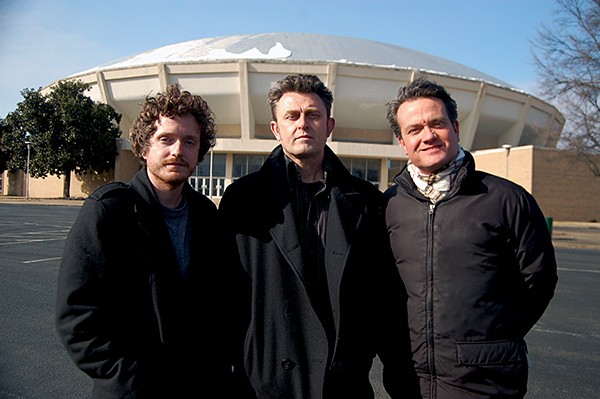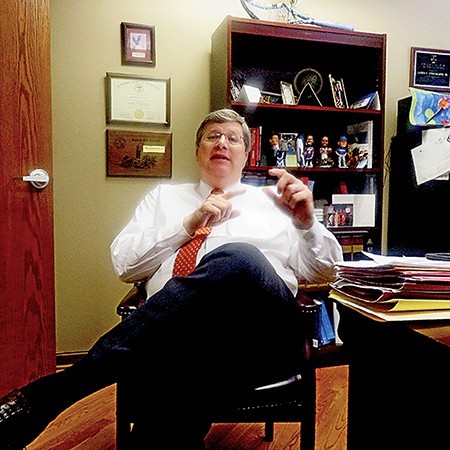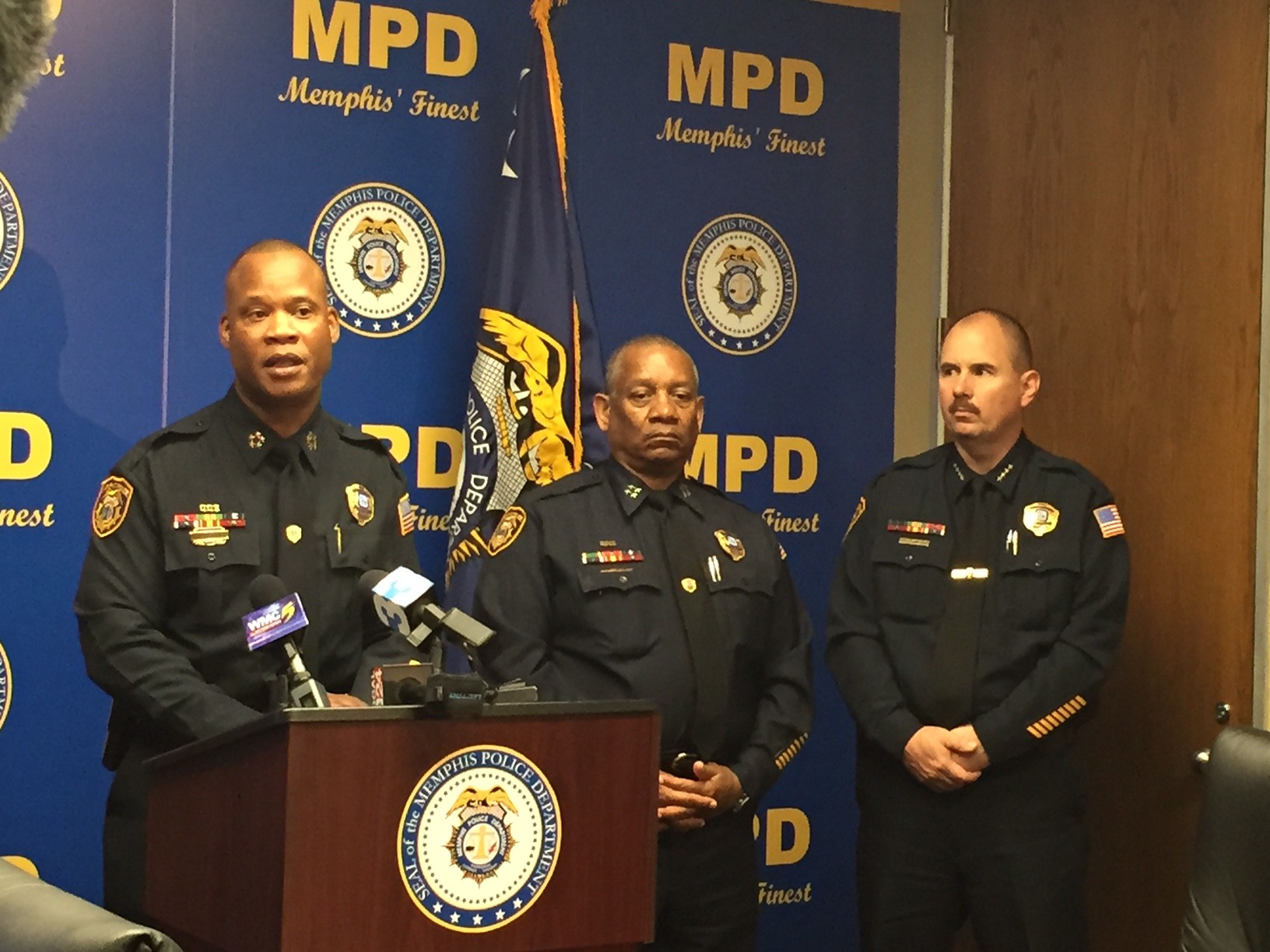Business
Bass Pro Shops: Last year, right here in this very same spot in this very same issue, we said the opening for the Bass Pro store in the Pyramid was delayed until May 2015. (We apologized because in 2013, right here in this very same spot in this very same issue, we said you’d be doing your 2014 holiday shopping there. Remember? No? Well…)
It’s not big news that the wait is over. Bass Pro Shops in the Pyramid opened April 29th with a line of customers that stretched into the parking lot. More than 35,000 visitors cranked the turnstiles that day.
 Brandon Dill
Brandon Dill
Bass Pro: now open.
By August 4th, more than one million people had visited Bass Pro Shops in the Pyramid. In mid-December, store officials said Bass Pro had seen more than two million visitors. Also, the store sold more than 27 tons of fudge in about eight months.
Ikea: Memphis rode high on the 2014 news that Ikea, the Swedish retailer with a cult following, announced it was building a store in Memphis, not “It-City” Nashville. And, boy, did we rub Nashville’s nose in it (on social media). Nashville, ya burnt! Ha!
Then, we noticed that no work — nothing — was being done on the Ikea site behind Costco on Germantown Parkway. The store, the source of our cool cachet, was held up by a tax dispute. The city breathed a sigh of relief when, in late November, locals came up with a tax-payment workaround and Ikea said it would go ahead with the Memphis store, with a late 2016 opening date.
 Brandon Dill
Brandon Dill
What’s in store for the Mid-South Coliseum?
Mid-South Coliseum: Can rape allegations save a building? Maybe. Last January, the Mid-South Coliseum seemed destined for the wrecking ball. Locals were considering the Tourist Development Zone deal, which would fund a huge plan to reinvent the Mid-South Fairgrounds into a youth sports destination. That plan had no place for the Coliseum.
A grassroots group, the Coliseum Coalition, started organizing. They hosted two events, called Roundhouse Revivals, to get people to the Coliseum and to get them to share their thoughts as to what it could be. The Urban Land Institute even said part of the Coliseum should be saved.
Then this summer, Robert Lipscomb, the city’s former director of Housing and Community Development and the major backer of the youth sports plan, was accused of raping a Memphis teenager, years ago. Lipscomb was fired, and the entire Fairgrounds deal, which includes the Coliseum’s future, was left up in the air, where it remains.
Tennessee Brewery: The only bad news about the Tennessee Brewery this year was for the thousands who loved drinking beer in its makeshift annual beer garden. Developer Billy Orgel bought the brewery building in 2014, a big win for preservationists, as the building was slated for demolition. In January, Orgel and his team unveiled a plan that included apartments, a parking garage, retail shops, and more, in a $25 million project called the Brewery District. Orgel promises a restoration of the historic building and a renewed vibrancy to South Main. He’s said the buildings could be complete and occupied in 2016.
The Pinch District: Not much is yet known about the future of The Pinch, except local leaders are making plans for changes.
In January, the district was in the crosshairs of the Tennessee Historical Commission, slated to be removed from the National Register of Historic Places. The plan was thwarted, then a MEMFix event in April brought in thousands.
In October, Memphis City Council member, Berlin Boyd, assembled government and business leaders to announce they were moving forward with plans in the Pinch. Though Boyd didn’t share many details, he did say that the area’s two largest tenants — St. Jude Children’s Research Hospital and Bass Pro — would likely drive much of the direction of the plan. That meeting came right before St. Jude announced an expansion plan for its Memphis campus worth about $9 billion (yes, billion with a “B”).
The Commercial Appeal: Until this year, the city’s daily paper had had one owner — Scripps — since Franklin D. Roosevelt was president. But it got a new owner in the spring of 2015 — Journal Media Group — and will likely have another by March.
Gannett Co., the largest newspaper company in the U.S., agreed in October to buy JMG for about $280 million. If the deal is approved by stakeholders and the government, it is expected to close in the first three months of 2016.
The move could possibly bring more layoffs in the CA newsroom. Some analysts are concerned the move could mean less emphasis on local reporting and bring a homogenous USA Today format to the paper’s look and writing. The deal also worries some media watchers, as it would mean Gannett would own all but one of the state’s major dailies.
Midtown Market: Those blighted buildings on the southwest corner of Union and McLean could be gone by June. That was developer Ron Belz’s prediction earlier this month to Memphis City Council members.
Later that day, the council agreed the city would take out a loan for $4 million to help Belz build “Midtown Market,” a mix of apartments, retail shops, and, perhaps, an “upscale” or “boutique” grocery store.
The city’s part of the funding was one of the last (and most critical) pieces of funding Belz said he needed to make the project work. City officials are still working on a plan to control traffic around the site, which will also soon have a new, expanded Kroger nearby.
Central Station: Want to watch a movie downtown next year? Well, it’s likely that you’ll be able to. Developers want to transform the 101-year-old Central Station building and the area around it at the corner of G.E. Patterson and Main into a residential and entertainment campus.
Henry Turley Co. and Community Capital LLC plan to transform the station building into a hotel, with a restaurant and some retail shops. Around the corner, they hope to build a Malco movie theater, apartment buildings, and, possibly, a grocery store.
The city council approved $600,000 for the project this month, which developers said they needed to begin construction. Expect dirt to move on the project soon.
One Beale: Scrapped during the recession, One Beale is expected to rise at the western end of Beale in 2016. If built, the $150 million project will change the city’s skyline with two — possibly three — new towers right on the Mississippi River: a 12-story office building, a 22-story hotel, and a 30-story apartment tower. Construction could take more than two years, pushing the grand opening to sometime in 2018. — Toby Sells
Food & Drink
The Green Room: The latest project from Jeff Johnson of Local/Oshi Burger Bar/Agave Maria, will be an event space and restaurant with a pop-up concept. Johnson is hoping to start holding events in the Green Room, located in the old Evergreen Grill space on Overton Park, as soon as January. He’s also planning to launch the restaurant that same month.
The pop-up aspect is ambitious. Fare and chefs will change on a regular basis. One idea Johnson is currently contemplating is a French brasserie. Johnson says he’s been in contact with chefs from Memphis and around the country to work in the Green Room. As for the name, he says it’s a nod to the location, the Evergreen neighborhood, as well as to green rooms, a space for celebrities and VIPs at TV shows and concerts. Johnson says he wants customers to feel like they’re the star of the show.
 Justin Fox Burks
Justin Fox Burks
Lyfe Kitchen
LYFE Kitchen and Catherine & Mary’s in the Chisca: The opening date is unknown at this point for these two restaurants set for the old Chisca Hotel, though it should be sometime in the coming year. The Carlisle Corporation, which has been renovating the Chisca, bought a minority share of LYFE in 2015 and moved its headquarters to Memphis. Carlisle opened the first Memphis LYFE, offering healthier meals in a fast-casual setting, in East Memphis.
In regards to Catherine & Mary’s, the partnership with Andrew Ticer and Michael Hudman of Andrew Michael Italian Kitchen, Hog & Hominy, and Porcellino’s was a bit of a surprise, as Ticer and Hudman seemed dedicated to building something of a restaurant commune on Brookhaven Circle. Catherine & Mary’s, according to a press release that announced the deal, will serve “traditional Italian cooking through the lens of the American South.”
The Curb Market: The Curb Market is a hyper-local market set to open in the old Easy Way space on Cooper in late January. It’s owned by Peter Schutt, who is also owner of two farms as well as The Daily News Publishing Co. Ben Fant of Farmhouse is working with Curb on its marketing. Fant says in an email: “Completely LOCALLY sourced produce, meats, and groceries. The goal of the market is to support local farmers and source their goods first. Depending on seasons, they will source regionally and on occasion, nationally, but always U.S.A. All meats will be grass-fed and free-range. Everything in the market will be economically viable and sustainable … The focus is on agriculture not agribusiness.”
Wine in Grocery Stores: It’s happening. Area grocery stores can start carrying wine in July. — Susan Ellis
Crime & Public Safety
Despite a shortage of Memphis Police officers, crime steadily decreased in 2015. Comparing statistics from January to November, crime was down 1.5 percent countywide and .6 percent in the city.
But the drop since 2006 has been phenomenal — 17.8 percent countywide and 13.6 percent in the city. That’s when the Memphis Police Department (MPD) first started using data-driven policing via its Blue Crush model. It was also the first year of Operation: Safe Community (OSC), a massive, multi-agency, crime-fighting initiative from the Memphis Shelby Crime Commission that addresses everything from offender recidivism to truancy.
“We’re down significantly from 2006, and if you go back to what some might say are the good old days of the late 1980s, we’re considerably down from those numbers as well,” said Crime Commission interim director Rick Masson.
It’s impossible to predict crime rates for 2016, but Masson said he believes we’re on track to continue the crime decrease. Next year will be the last year for the current version of OSC, and various law enforcement agencies will be coming together to work on another five-year OSC plan to launch in 2017.
The MPD will gain a new police director in 2016. Current Director Toney Armstrong announced in October that’d step down once Mayor-elect Jim Strickland found a replacement. One challenge for Strickland and the new police director will be hiring and retaining officers.
“There’s a shortage of police officers, so that’s something that will have to be addressed by the new administration,” Masson said.
At a public forum this month, Strickland’s transition team threw out a few ideas to reduce crime. They set a goal of decreasing police resignations by 20 percent in his first year and 30 percent each year during the rest of his term. They also want to reduce police response time to an average of three minutes, educate the public on the proper use of 911, and fully staff the 911 call center, and seek public/private partnerships to offset the costs of police recruitment classes.
The city’s rape kit testing backlog should be cleared in 2016, according to Memphis Sexual Assault Kit Task Force coordinator Doug McGowen. “We hope to have the vast majority of the kits tested in 2016. We ship about 300 a month out, and we have about 3,900 that need additional analysis, so we’ll be very close to meeting that goal,” McGowen said.
McGowen, who has been tapped by Strickland as the city’s new chief operating officer, said he’d continue to run the task force for the foreseeable future.
— Bianca Phillips
Music
The New Daisy: After signing an exclusive booking deal with Live Nation, the New Daisy went through major renovations and became one of the best places to see live music in Memphis. The “new” New Daisy features a state-of-the-art sound system and stage lighting, and even a VIP area known as the Big Star Room.
After years of being the bookend on the dark side of Beale Street, the New Daisy is alive and well, and bringing big names like Dropkick Murphys and Disturbed to Memphis in 2016.
FedExForum: The Forum has a stacked calendar early in 2016, with Barry Manilow, The Doobie Brothers, and Billy Joel (the Piano Man’s only Tennessee appearance) coming to town.
The Hi-Tone: The club changed hands just over a year ago, but the Crosstown venue is still going strong under the direction of Brian “Skinny” McCabe, hosting festivals such as Gonerfest and Rock For Love, in addition to specializing in metal, punk, and garage rock shows.
Bar DKDC: This small Cooper-Young restaurant/bar has become a full-fledged venue, with local and touring talent playing the room on a weekly basis. Don’t expect that to stop anytime soon.
Rocket Science Audio: RSA continues to be one of the most intriguing venues/recording studios in Memphis, and their monthly Variety Show has come a long way since its inception. Expect big things from them in 2016.
Found: Another new venue worth a mention is the vintage clothing/furniture store on Broad Avenue that every so often hosts musical up-and-comers of all kinds in its back room.
Lafayette’s: The signature music club in Overton Square continues to make the Square a hot destination for tourists and locals alike by booking bands every night of the week. Expect that to continue in 2016.
Levitt Shell: It was recently announced that the Shell will undergo $4 million dollars in renovations. The Overton Park outdoor venue will receive upgrades to its sound system, bathrooms, and musician load-in area. In addition, a bigger, permanent area for vendors will be constructed. All those improvements should make for an exciting (and packed) Concert Series.
The Bands: Plenty of Memphis acts had strong years in 2015, including NOTS, Cities Aviv, Julien Baker, and Lucero, to name but a few.
NOTS released their debut We Are Nots late last November, then did lots of touring before impressing the U.K. label Heavenly Recordings at South by Southwest. The label brought NOTS to Europe last month for a slew of shows. NOTS begin working on their sophomore LP in January.
Cities Aviv also continued to be one of the most intriguing figures in the Memphis rap community, even if he spent most of the year in New York City. He’s back in Memphis now, and his new album Your Discretion is Trust, is some of his best work.
After conquering Europe with his sidekick Quinton-JeVon Lee, aka RPLD GHSTS, expect to see plenty of Cities Aviv in 2016, starting with a Hi-Tone show in early January.
 Andrea Morales
Andrea Morales
Julien Baker
Julien Baker is another Memphian who had to leave the city to get national recognition (she currently attends MTSU). Her debut album Sprained Ankle, released this fall, has been championed by NPR, Pitchfork, and every other music media outlet that has good taste.
Other local bands to watch out for in 2016 include Deering and Down (who have a new album coming in early 2016 from BAA), HEELS, Aquarian Blood, Evil Army, RPLD GHSTS, and the Sheiks, who are already headed back to Europe in 2016 with Jack Oblivian.
Hometown champs, Lucero, dropped a great new record that they recorded at Ardent with Ted Hutt, and they also join the ranks of Memphis bands crossing the pond in early 2016.
Deck the Halls: The 2015 openings of the Blues Hall of Fame and the Memphis Music Hall of Fame were notable events, creating two worthwhile institutions that will honor Memphis music for years to come, in addition to bringing in tourism revenue. The opening ceremony of the Memphis Music Hall of Fame brought Jimmy Fallon, Justin Timberlake, and Keith Richards to town, making for one of the most star-studded events of the year.
Vinyl Thoughts: The Memphis Record Pressing plant is up and running, cranking out records for Sony, Fat Possum and Goner, and bringing the vinyl business back to the birthplace of rock-and-roll. It’s an amazing addition to our music resume to be one of the few cities in the United States to have a vinyl pressing plant. Take that, Nashville! — Chris Shaw
Politics
Hillary’s Boast and Red-state Reality: The most obvious political fact about 2016 is that it’s a presidential-election year, and that fact would ordinarily not be expected to ruffle Tennessee’s red-state Republican feathers, except that presumptive Democratic nominee Hillary Clinton has already barnstormed the state once, declaring that she intends to “turn Tennessee blue” again by dint of hard and purposeful campaigning here — something that Barack Obama conspicuously did not do in either 2008 or 2012.
Of course, presidential elections still call out Democrats in disproportionate numbers to the polls, and if Donald Trump should keep on keeping on and succeed in telling the Republican establishment, “You’re fired,” then really weird things could happen here.
But, as things stand now, Clinton would have to recreate a state party infrastructure, more or less Phoenix-like, from the ashes.
City Council and County Commission: Memphis’ newly configured city council seems well-stocked with youthful, business-friendly members, a good match-up with the city’s new mayor, Jim Strickland, who made his name as a council advocate of fiscal solvency above all. (Which means that the core issue of how to retain a stable police force in the absence of restored benefits will continue to be a vexation.) And, while Democrats are nominally a majority-of-one on the Shelby County Commission, the chairman, Terry Roland, is a Republican, and, on key votes, Democrats Justin Ford and Eddie Jones fairly persistently go with the GOP, more than canceling out Republican Steve Basar’s working relationship with the Democrats.
Beyond matters of partisanship, the unresolved issue in county government is whether the current commission power struggle with county Mayor Mark Luttrell succeeds, and to what extent.
Electoral Matters: It wouldn’t be an even-numbered election year without somebody venturing once again to do that which so far nobody has succeeded in doing — namely, mounting a serious challenge against 9th District Congressman Steve Cohen.
Among those who have been talked up — by themselves or by others — as itching to take a shot are attorney Ricky Wilkins (a redux case from 2014), state Representative G.A. Hardaway, and, most recently, state Senator Lee Harris.
And, though Harris’ seat wouldn’t be the right location geographically, current Shelby County Commissioner Heidi Shafer, an East Memphis Republican, is looking hard at making a run, ASAP, for the state legislature. That’s why Shafer, the commission’s budget chair for three years running, opted to chair the legislative affairs committee this time around.
Haslam’s Task: The 2016 session of the General Assembly is just around the corner, convening on January 12th. And that aforesaid GOP legislative majority has seemingly peaked out at a hyper-conservative level too daunting for either of moderate GOP governor Bill Haslam’s two major wish-list items — his Insure Tennessee proposal for Medicaid (TennCare) expansion, which was blocked in the General Assembly last year, or any form of a gasoline tax to fund overdue attention to the state’s increasingly obsolete infrastructure.
State Senator Ron Ramsey, the state’s lieutenant governor and presiding officer of the Senate, usually calls the shots on such things, and he has basically declared that the Medicaid-expansion matter will not be considered until and unless an elected Republican president, post-2016, proposes the additional funding via block grants to the states.
As for the question of infrastructure improvements, a little bit of good news — a modest windfall in unexpectedly good state revenue collections — may extend the bad news of inaction on creating new funding sources for roads, bridges, and the like. Current thinking within the legislature is apparently to sprinkle the bonus funds where they are most needed but to eschew any major upgrades. — Jackson Baker
LGBT Rights
The U.S. Supreme Court’s ruling in favor of marriage equality nationwide will ensure that 2015 goes down as perhaps the most important year in the fight for LGBT rights.
But, in Tennessee (and a handful of other conservative states), the battle might not be over. The Tennessee Natural Marriage Defense Act was filed in September, and if passed, it would revert the state definition of marriage back to one man and one woman, and it would require the state attorney general to defend local government officials who refuse to recognize the Supreme Court’s marriage ruling.
 Justin Fox Burks
Justin Fox Burks
Cole Bradley
“The federal government doesn’t preempt the action of legislatures. In other words, if the federal government gets wind of an unconstitutional bill being filed, they don’t send a note to the legislature saying, by the way, you can’t do that,” said Tennessee Equality Project (TEP) Executive Director Chris Sanders.
“What happens is the legislature passes its law, and it goes into effect. It harms someone, and then someone has the basis to sue the state. If passed, it could temporarily interrupt marriage equality,” he said.
Sanders believes the bill would eventually be struck down, once lawsuits make their way to the Supreme Court.
“I think they’ll lose at every turn. That’s why we all pray for [Supreme Court Justice] Ruth Bader Ginsberg every night,” Sanders said.
Sanders said TEP is also watching a state Pastor Protection Act, which would “protect religious clergy” from having to perform same-sex weddings. But he points out that such a bill would be redundant since pastors are already protected by the First Amendment.
“There could also be bills that ‘protect’ businesses from having to do business with our community, particularly wedding vendors,” Sanders said. “And another possible bill would exempt local government officials, like a county clerk, from having to serve our community. That’s a Kim Davis-style bill.”
Transgender rights also may be on the line in Tennessee in 2016. Tennessee Representative Bud Hulsey announced his intention to file a bill that would prevent transgender students from using the bathroom that corresponds with their gender identity.
Some possible bills may have a direct impact on LGBT equality in Memphis.
“We’ve heard some rumors that there could be a bill to try and undo existing local nondiscrimination ordinances, like the one in Memphis,” Sanders said.
On a more positive note, the Memphis Gay & Lesbian Community Center (MGLCC) has announced that they will launch a new program in 2016 to house homeless LGBT youth. Dubbed the Metamorphosis Project, it will employ refurbished shipping containers as transitional housing structures, and it will be the first housing project for LGBT young adults in the city. The shipping containers will be set up on property the MGLCC has purchased in Orange Mound from the Shelby County Land Bank.
“We’re going to alter the containers by adding windows and doors and making them into individual living spaces with a bedroom and a bathroom,” said MGLCC Youth Services Manager Stephanie Reyes. “And we’ll have an administration building there with a classroom, where we’ll teach classes on writing a resume, nutrition, and life skills.”
— Bianca Phillips
Film
The new year will kick off with Ocsar hopefuls like The Revenant hitting Memphis screens, and the Sundance Film Festival debuting the year’s crop of indie and arthouse pictures. We’ll get to see if the long-delayed Western Jane Got a Gun starring Natalie Portman was salvaged after a troubled production. February looks livelier than usual with the Coen Brothers’ Hail, Caesar!, the Marvel comedy superhero Deadpool, and Zoolander 2, which heralds the return of Ben Stiller’s beloved male model. March gets us the Iraq War comedy/drama Whiskey Tango Foxtrot, and the long awaited Batman v Superman: The Dawn of Justice which, if the trailers are any indication, could be a historic debacle. More intriguing is the biopic I Saw the Light where Tom Hiddleston (aka Loki) plays Hank Williams.
Richard Linklater’s new film Everybody Wants Some debuts in April, as does Iron Man director Jon Favreau’s live action adaptation of The Jungle Book, which presumably has some reason to exist. Summer blockbuster season starts in earnest with the new Marvel epic Captain America: Civil War and X-Men: Apocalyspe. For the more serious-minded, there’s Snowden, the tale of the NSA whistleblower. June brings us the big-budget video game adaptation Warcraft, helmed by Moon director Duncan Jones, and the sequel to Finding Nemo, Finding Dory.
July sees Steven Spielberg’s Roald Dahl adaptation The BFG and The Legend of Tarzan, directed by Harry Potter‘s David Yates from a script penned by Memphis’ own Craig Brewer. Then the all-female Ghostbusters remake will do battle with Star Trek Beyond. In August we get the all-villain comic book oddity Suicide Squad and the story of the gulf oil spill in Deepwater Horizon.
The theme for November will be magic, with Marvel’s sorcerer supreme Doctor Strange squaring off against J.K. Rowling’s Fantastic Beasts and Where to Find Them, while Indie Memphis brings the scrappy underdogs to Memphis screens. December will be once again dominated by Star Wars with Rogue One telling the story of how Princess Leia got the plans to the Death Star.

 Memphis Police Department
Memphis Police Department  Brandon Dill
Brandon Dill  Brandon Dill
Brandon Dill  Justin Fox Burks
Justin Fox Burks  Andrea Morales
Andrea Morales  Justin Fox Burks
Justin Fox Burks 
 Greg Cravens
Greg Cravens  Jackson Baker
Jackson Baker  Toby Sells
Toby Sells 

